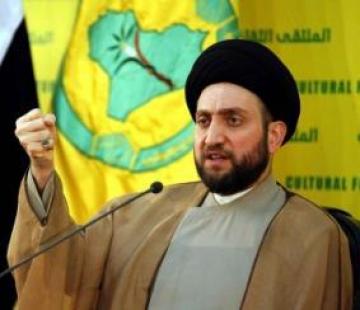Proposed settlement does not seek quota-based governance: Sunni alliance

The chairman of the Islamic Supreme Council of Iraq Ammar al-Hakim

The draft proposed by the alliance will be submitted to “political partners” as well as to the Secretary-General of the United Nations after debates among “active Sunni players”, said alliance member Ali al-Mathbouti in statements on Monday.
Shia cleric, leader of the Iraqi National Alliance and chairman of the Islamic Supreme Council of Iraq, Ammar al-Hakim, spearheaded months ago a project for national reconciliation among various Iraqi political powers and social sects with the aim of promoting peaceful co-existence after the elimination of Islamic State militants from the country. His settlement promotes ensuring the rule of law, abandoning violence and fair distribution of wealth. It excludes personalities linked to IS or the regime of late president Saddam Hussein.
But his draft has been met with reluctance from Sunni blocs led by the Alliance of Iraqi Forces and even from some Shia powers, most notably the State of the Law bloc, led by vice president and former PM Nouri al-Maliki.
“We do not call it a Sunni draft, it is a draft for building a genuine state based on institutions where all Iraqis enjoy equal rights and duties, away from the quota-based state, the disadvantages of which we are currently experiencing,” Mathbouti said.
Sunni opposition to the settlement draft became more vocal when the Shia-dominated parliament approved in November a law legalizing the status of the Shia-led, Iran-backed al-Hashd al-Shaabi popular militias which fight Islamic State militants on the Iraqi government’s side. Sunni powers had slammed the enactment of the law, saying it gives unchecked powers to the militias and fails to ensure rights and credit to Sunni volunteer fighters taking part in battles. The development prompted Sunni powers to voice their rejection of the settlement proposal before the United Nations officials who had welcomed the project.
On Sunday, Erem News quoted a member of al-Maliki’s State of the Law bloc who said, on conditions of anonymity, that his bloc is rather inclined towards a “social reconciliation” rather than “political settlement”.
“In its current form, the settlement is at odds with the Iraqi constitution and law, and is designed to return members of Saddam Hussein’s regime to power,” said the MP.
On Sunday, al-Hakim, in a statement by his office, defended his version of political settlement as a surety for Iraq’s unity and as vital for stopping “Iraqi bloodshed”.
